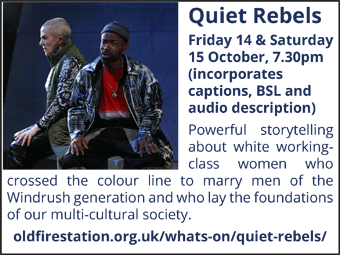Quiet Rebels, an innovative and at times frustrating new play created by Vital Xposure and Dervish Productions, is set in both a few years into a horrific alternate future and decades ago in an alternate past. The premise is: racist MP Enoch Powell became prime minister, and in the new authoritarian society, it becomes a crime for couples to marry across race lines. Mixed-race children are referred to as ‘hybrids’.
The play draws its dystopia from the real-life discrimination and hatred white women who married men of the Windrush experienced. and the show opens with documentary footage projected on a large, sculpture-like screen on the stage, used throughout the show, of real women discussing their experiences. While this is effectively moving and engaging, the fact that it is not then bookended, makes it feel a bit heavy-handed; like a summarizing statement introducing the essay.
The body of this particular work concerns Detective Shade, an investigator raised by an esteemed family in Powell’s inner circle. Shade is assigned the murder of Aileen Burnett, a so-called ‘Race Traitor’ who is suspected of helping to smuggle several hybrid children out of the jurisdiction. So we see Detective Shade gathering information, or at least attempting to - her efforts are stymied at every turn.
But while this goes on, Detective Shade is also in rehabilitative therapy, ostensibly due to her ongoing stress headaches and insomnia, though we quickly gather something more sinister is afoot. Dosed up on a salad of sedatives, EDMR and hypnosis, we see long-repressed childhood memories resurface, projected on the wall behind the cast members in the scene. It’s evident Shade’s superiors are searching for something, and unless she can find it first, her days are numbered.
The twist of Quiet Rebels, if you can call it that, is so obvious it seems unlikely to surprise anyone except its own main character. I won’t spoil it here, but I will speculate this predictability is intentional. Wearing the dressings of a neo-noir murder mystery, the heart of the story is less of a whodunnit and more a character piece, about forming your entire identity around authoritarian ideals and the oppression of others, and the anguish and rebirth that must occur when you can no longer occupy that identity. I wanted the play to ask us how redeemable is Shade, who is played as thoroughly sympathetic throughout in an oddly vague and unambitious way: lines are told with neither a dogmatic zeal nor a haunted confliction. We’re never sure what Shade truly believes or wants, and I found myself craving a solid monologue, something to reveal the pain and complication of this character.
There’s a lot going on in this piece, and at times it makes the cultural commentary feel in competition, rather than collaboration, with the speculative elements. A simpler framing device may have allowed these individual stories a chance to snowball in power and impact. There are moments woven throughout, in a flashback or in an angry relative standing up to Shade’s contempt, that let us into the play's heart. The enormous courage of these women and men in the face of constant, grinding bigotry, should underpin the other elements of the show, but often it feels like the inverse is true. This is never truer than with the show’s abrupt ending - the climatic moment is not given to the character who’s earned it, and rings deeply untrue with everything we know about that character’s psyche and the environment around them.
It’s a shame the story and characters don’t entirely ring true because the more technical elements of the show are polished and innovative. There is a very effective use of the projected video screen for some performances (it lends a machiavellian head honcho boss, who only appears via projection, an unnerving sense of imposing authority) and there is closed captioning and British Sign Language throughout, making the show entirely accessible to members of the d/Deaf and hard of hearing communities. There is also an intricate use of subtle sound effects and archival footage and cleverly flexible stage space.
The acting is also strong - three of the cast of six play multiple roles throughout, and bring them to life beautifully. Particularly impressive is Lottie Bell in a dual role as both a chillingly smug doctor and a heroic Windrush wife.
Ultimately, while let down by undercooked plotting and character, this is a heartfelt and ambitious production with some fascinating ideas and strong feelings behind it. There’s nothing else quite like it on stage right now.





